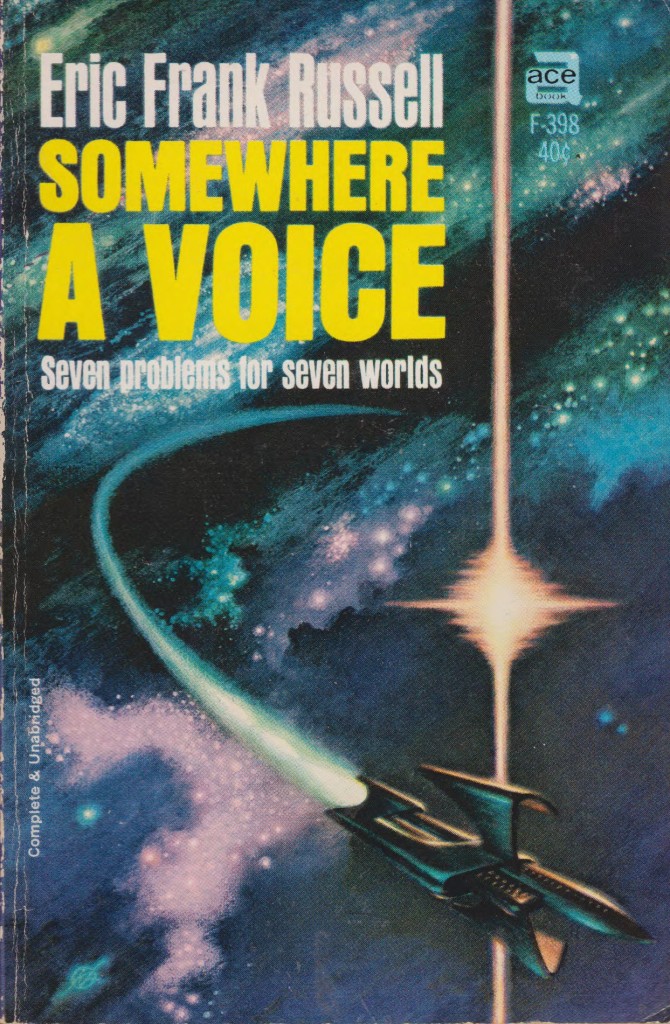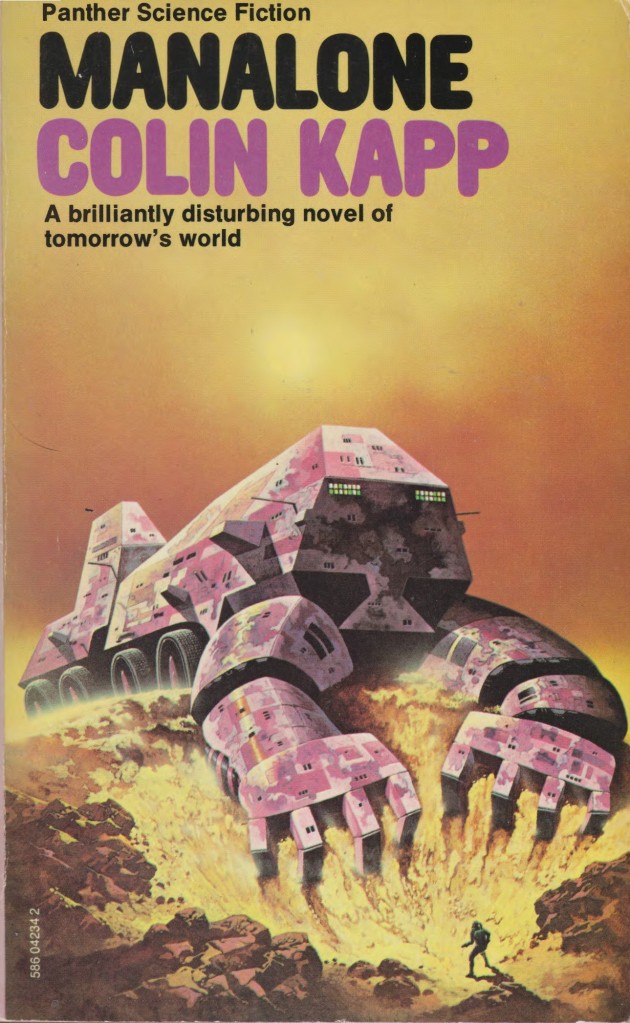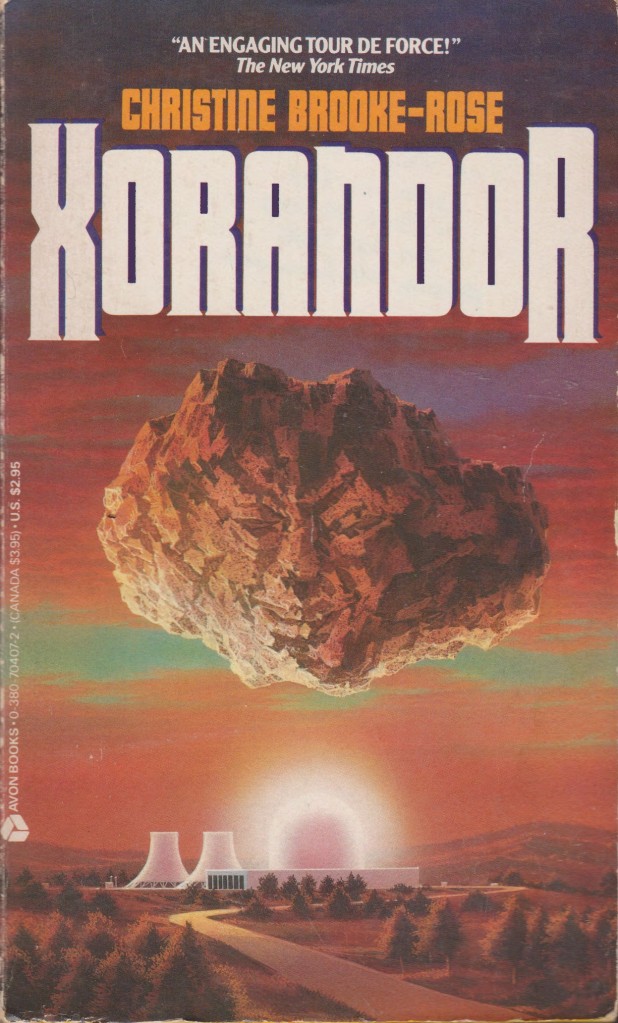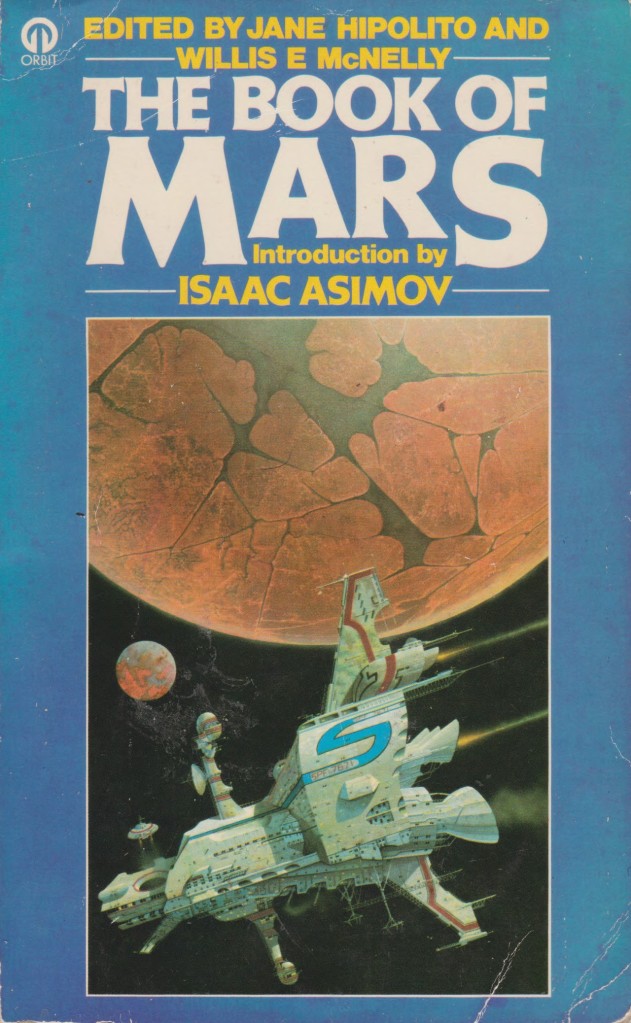Which books/covers/authors intrigue you? Which have you read? Disliked? Enjoyed?

Kelly Freas’ cover for the 1966 edition
1. Somewhere A Voice, Eric Frank Russell (1965)
From the back cover: “A band of shipwrecked spacemen making their way across a world so fierce that all Earth’s jungles tame by comparison…
A future euthanasia agency with a double-barreled scientific secret…
The unexpected problem of a lone astronaut with an entire ocean world to himself…
These are some of the science-fiction premises that Eric Frank Russell has cooked up in this new collection of novelettes and stories. SOMEWHERE A VOICE is a book worthy of the brilliant talents of the author of THE SPACE WILLIES and SENTINELS FROM SPACE.”
Contents: “Somewhere a Voice” (1953), “U-Turn” (1950), “Seat of Oblivion” (1941), “Tieline” (1955), “Displaced Person” (1948), “Dear Devil” (1950), “I Am Nothing” (1952).
Initial Thoughts: One of many 50s authors whom I have not explored sufficiently at this point in my SF reading career. I’ve only read and reviewed The Great Explosion (1962). Any goodies in this collection?
2. Manalone, Colin Kapp (1977)

Angus McKie’s cover for the 1st edition
From the back cover: “Tomorrow’s Future Shock
WHY
is the government deliberately destroying all trace of Man’s past?
WHE
are the laws of gravity and momentum strangely altered?
WHY
has the world’s population continually increased without the predicted eco-crisis taking place?
WHY
is there an international conspiracy to conceal the future of the human race?
These are just some of the reality-shattering questions that face Manalone, a brilliant computer scientist, when he tries to find out exactly what has happened to humanity. Manalone, outcast from society, must fight the entire machinery of a ruthless police state to discover the truth. And the truth is an awful, chilling one, that sounds only too real in today’s world.”
Initial Thoughts: I’m not sure why I bought this one. Kapp’s “Hunger Over Sweet Waters” (1965) and “The Pen and the Dark” (1966) represent the threads of hard-SF that bounce off me (and the rest of the stories in the linked-collection The Unorthodox Engineers (1979) that I never managed to review). Sometimes I make bad decisions.
3. Xorandor, Christine Brooke-Rose (1986)

Uncredited cover for the 1988 edition
From the back cover: “‘THE FIRST TIME WE CAME ACROSS XORANDOR WE WERE SITTING ON HIM!’
And no wonder! For Xorandor is a rock (actually, a Martian computeroid creature) who befriends computer whiz kids Jip and Zab. Xorandor has a message: He and his offspring, feeding on radioactive wastes, may have eaten a warhead. Now, the world is interested: Are brainy stones the answer to nuclear waste disposal? can they stop the arms race? And what are the stones really about? Jib and Zab know. But no one will listen.. and disaster seems inevitable.”
Initial Thoughts: Christine Brooke-Rose remains best known for her experimental SF novels Out (1964) and Such (1966). I haven’t been able to find copies, yet. As I often dabble a bit around the edges of an authors works first, I decided to instead track down one of her later novels “ostensibly” for children: Xorandor (1986). If you want to read more about her fascinating background and work, check out her SF Encyclopedia entry.
4. The Book of Mars: Tales of Mars, Men and Martians (variant title: Mars, We Love You), ed. Jane Hipolito and Willis E. McNelly (1971)

Patrick Woodroffe’s cover for the 1976 UK edition
From the back cover: “Canals, dying civilizations, hurtling moons, desiccated polar caps, dust storms, unending vistas of red sand…
Asimov, Heinlein, Ray Bradbury, Frank Herbert, Arthur C. Clarke, Edgar Rice Burroughs, Harlan Ellison…
These are just a few of the ideas and authors featured in this anthology which brings together the very best writings about the Red Planet–H. G. Well’s [sic] classic War of the Worlds to recent SF stories by Harry Harrison and Barry Malzberg.”
Contents (including non-fiction): Giovanni Schiaparelli’s “Report on Canali” (1877), Percival Lowell’s “Mas as the Abode of Life” (1908), H. G. Wells’ The War of the Worlds (1898) (excerpt), Edgar Rice Burroughs’ A Princess of Mars (1912) (excerpt), Stanley G. Weinbaum’s “A Martian Odyssey” (1934), Donald A. Wollheim’s “The Embassy” (1942), Lester del Rey’s “Dark Mission” (1940), George O. Smith’s “Lost Art” (1943), P. Schuyler Miller’s “The Cave” (1943), Anthony Boucher’s “Expedition” (1943), Arthur C. Clarke’s “Loophole” (1946), Damon Knight’s “Catch That Martian” (1952), H. Beam Piper’s “Omnilingual” (1957), Ray Bradbury’s “The Lost City of Mars” (1966), Harry Harrison’s “One Step from Earth” (1970), Frank Herbert’s “Carthage: Reflections on a Martian” (1971) (poem), William Fox’s “Soft Landing” (1971) (poem), Irene Jackson’s “Earthbound” (1971) (poem), Harlan Ellison’s “In Lonely Lands” (1959), Bruce McAllister’s “World of the Wars” (1971), Barry N. Malzberg’s “Exploration” (1971), Robert A. Heinlein’s Double Star (1956) (excerpt), Willis E. McNelly’s “Linguistic Relativity in Middle High Martian” (1970) (essay)
Initial Thoughts: I enjoy themed-anthologies. This one reminds me of a reader as it contains excepts from various longer novels on the topic and non-fiction.
For book reviews consult the INDEX
For cover art posts consult the INDEX
For TV and film reviews consult the INDEX
I haven’t read Kapp’s other novels but Manalone is certainly not a bad decision! I enjoyed it from start to finish and consider it an underrated, well-paced gem from the latter days of new wave SF.
That’s good to hear. I was very unimpressed with the two short stories (linked above) that I’ve reviewed of his — and his collection the Unorthodox Engineers that I never managed to review. None of those seemed at all interested in picking up any element of the trends of the New Wave.
I forgot to mention that Manalone was an early example of a cyberpunk novel, too, given that the protagonist is a mix between a computer scientist, hacker and detective investigating his own corporation. So in a lot of ways, Kapp was one of those authors who, alongside James Tiptree Jr. (with “The Girl Who Was Plugged In”) and John Brunner (with The Shockwave Rider), helped bridge the gap between new wave and cyberpunk.
Intriguing.
I do love “The Girl Who Was Plugged In” https://sciencefictionruminations.com/2018/12/28/book-review-new-dimensions-3-ed-robert-silverberg-1973-le-guin-tiptree-jr-lafferty-malzberg-effinger-et-al/
And Shockwave Rider although I read it before I started my site.
I’ve read a few Unorthodox Engineer stories and have also been underwhelmed. I’ll be interested in what you think of Manalone, which I have not read.
As for the Russell, “Dear Devil” is the best known story, and the only other one I recall reading is “I Am Nothing”. “Dear Devil” is nice enough, but pretty sentimental. A good story, not a great one.
I have not heard of Christine Brooke-Rose! I’ll have to investigate her. And to be honest that Martian anthology looks a tad underwhelming. I’m surprised it doesn’t include “Dear Devil”!
And looking at those cover paintings — there’s a distinct resemblance, seems to me, between the work of Angus McKie, Patrick Woodroffe, and another British artist, Chris Foss.
I have Russell’s “Dear Devil” on a list I’m compiling–perhaps for a future review series–on Race and Science Fiction. It was referenced in a monograph I read (I’ll have to check which) as a 50s example of a story that tried to deal with the topic but wasn’t addressed at length so I’m not exactly sure what it’s about (other than aliens come from Mars to a devastated Earth, right?).
I call the UK stable of artists “Foss and His Clones.” Maybe a good band name. Everyone can dress up as a lumpy spaceship.
Rich H: …there’s a distinct resemblance, seems to me, between the work of Angus McKie, Patrick Woodroffe, and another British artist, Chris Foss.
Actually, Woodroffe was a very different kind of artist. He was playing in the Foss giant spacecraft school of illustration for the cover used for the Mars book. But his work more typically looked like this —
https://scontent.flhr3-4.fna.fbcdn.net/v/t31.18172-8/1655766_921704901232367_8058703109961075811_o.jpg?stp=dst-jpg_p526x296&_nc_cat=102&ccb=1-7&_nc_sid=9267fe&_nc_ohc=srsKpwzfGtoAX9O70Av&_nc_ht=scontent.flhr3-4.fna&oh=00_AfAlbRJ28lbc1wFej92Ld1kH6O4wShMPtyzFgQqW52jMJg&oe=64528BDF
Or this —
https://scontent.flhr3-3.fna.fbcdn.net/v/t39.30808-6/317865493_580516300743026_5401275662272747319_n.jpg?_nc_cat=107&ccb=1-7&_nc_sid=730e14&_nc_ohc=CEGphC8Rz3cAX-l831c&_nc_ht=scontent.flhr3-3.fna&oh=00_AfBndkrswjmJ0gKYSfn76vC-lQ73z8OgQJYl0kYjnHVSCw&oe=642F80D3
Unless I’m confusing it for another novel (My copy is not on hand to check), Manalone has perhaps the single most disappointing/infuriating ending of any book I’ve read. I won’t spoil it for you.
Don’t worry about spoiling anything. I tend to read about novels long before I read them — same thing with many short stories.
TOTAL SPOILER: It’s basically one guy against a dystopian/totalitarian system. He starts by fleeing as the bodies pile up around him, then goes on the hunt himself, for the explanation of the anomalies and the small cabal dictating life and death for billions, and when he’s finally in the room with them, they reveal they’ve been testing his abilities all along and he’s proved he’s one of the few capable of being trusted with humanity’s fate, so why not join the murderous fascists? And he does. The end.
I’ve found that ending more frequently than I want to. Poul Anderson’s generation ship short story “The Troublemakers” is essentially the same thing. The instability and oppression is all part of the plan and he’s the one they want to lead the ship…. I’ll feature Anderson’s story in my series on gen ship short fiction eventually as I am something of a sadist and will read all the pre-1985 examples!
Manalone sounds pretty great imo from the description. Also love the wonky cover.
I can’t say that I’ve had good experiences with Kapp. That said, I’m always willing to give an author a second chance!
As for the cover, I won’t say anything other than it’s not a style (the UK blobby machine) that resonates with me.
JB: I can’t say that I’ve had good experiences with Kapp. That said, I’m always willing to give an author a second chance!
Kapp was an old-school Carnell-era NEW WORLDS British author, third-or fourth rate even in that milieu, who was one among a number of those types who in the latter 1960s jumped markets to Campbell’s ASF (and to trad American SF publishers like Ace) when the New Wave took over at NW and, simultaneously, Campbell was having increasing difficulty finding American authors who’d tolerate his foibles and restrictions. Bob Shaw would be an example of another, rather better, writer of that type.
JB: Kapp’s (stories) represent the threads of hard-SF that bounce off me (and the rest of the stories in the linked-collection The Unorthodox Engineers (1979) that I never managed to review
The Unorthodox Engineers are no more hard-SF then Robert Sheckley’s AAA Ace stories (or than Dungeons & Dragons and Marvel comics, for that matter.) They’re also about as good as Kapp got, so if you don’t like them you probably won’t like anything he did.
I beg leave to differ about Kapp, though not by much. The Unorthodox Engineers stories were rather schematic pretend-hard SF and frankly tedious to my taste. Some of his other work was entertainingly crazy, such as TRANSFINITE MAN a/k/a THE DARK MIND, which might be viewed as a sort of hyper-noir reiteration of THE STARS MY DESTINATION. Notice I didn’t say it was good.
John B. I beg leave to differ about Kapp, though not by much.
I did remember THE TRANSFINITE MAN actually, and Kapp might get a couple of points from me for that one. (Hey, just its title is enough.) But I’m partial to Van Vogt-style extreme SF in all its glorious illogicality and, sometimes, near-illiteracy, provided it’s imaginatively wild enough (e.g. Van Vogt’s ‘Recruiting Station’ and ‘The Monster.’)
The host of this blog, JB, is not, usually. And frankly it would be a hard sell, because — as you say — it’s not like THE TRANSFINITE MAN is actually good. *
So I think we remain in agreement across the board on Kapp’s oeuvre.
*There are a number of things I read when I was, like, ten years old, such as Kenneth Bulmer’s CITY UNDER THE SEA, or Kapp’s TRANSFINITE MAN or Mack Reynolds’s DAWNMAN PLANET that made an impression on me then for their conceptual content. From time to time, I think about re-reading them to find out what I make of them now and if they were anything but unrelieved trash.
I agree with John on this one Mark.
Paragraphs like the one below from ““Hunger Over Sweet Waters” (1965) litter Kapp’s work (in this instance, from his own background as an electroplating consultant engineer). At least the stories in Unorthodox Engineers and similar technological puzzle stories like “Hunger”, attempt to generate the sheen of the “scientific”.
““This is the copper region of Hebron V, and some of the current streams carry a fairly pure but dilute solution of copper salts in water. Factually, the copper concentration in these streams is so low that the attempt to extract the copper from the stream by the usual methods of cementation of electrolysis would be a costly and inefficient business. But if I pass the dilute liquor through a cation resin column, the copper ions will remain in the resin bed while the radical with which it was combined will pass on out of the column, the copper ions will remain in the resin bed while the radical with which it was combined will pass on out of the column, together with whatever ions the copper has itself displaced—in this case, hydrogen” (54).”
But, as others have pointed out, I guess some are quite different and don’t attempt to engage with their material in this way.
I remember reading – and enjoying – Cageworld by Kapp, which was anything but hard SF, being basically pulp, and have just bought it on Amazon. So far, so good!
Glad I (maybe) inspired by mentioning his name a return to a fond reading memory!
I finished it last week! Still pretty good.